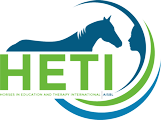Dear HETI Members,
The Federation of Horses in Education and Therapy International A.I.S.B.L. (HETI), is an international membership organisation representing a rich diversity of organisations and individuals who are working to help, support or educate people with horses or other equines involved as a key factor. HETI represents practitioners, facilitators, instructors, educators and therapists globally across sectors such as:
· Mental health
· Physical health
· Social Care
· Education
· Personal development
· Wellbeing
· Social Inclusion
This list is not exhaustive and simply aims to differentiate the services within HETI’s remit from equine activities which are recreational or sports-related in their focus.
Unsurprisingly, in a field which covers such a wide variety of practices, cultures and geographies and which is constantly innovating; reaching consensus on terminology is difficult to achieve. As can be seen from recent research, international terminology currently used when describing the provision of human services that incorporate horses is poorly defined, not uniformly used or understood and therefore can be confusing and misleading to everyone from service users, service providers and researchers (1). This view was supported by a survey carried out by the HETI terminology taskforce presented at HETI Seoul 2021.
HETI frequently communicates with members and other stakeholders, and we need concise terms to describe our diverse sector.
For these reasons as an initial step we recently consulted members about the acceptability of HETI utilizing potential unifying terms in all our communications aimed at the entire field represented by our members.
The terms we consulted with members on were :
- Equine Assisted Services (EAS)
- Service provider (SP)
- Service user (SU)
The consensus was clear amongst our members (2) that these are acceptable terms and HETI has therefore decided to adopt them in HETI communications, please note however that we do not intend to impose this terminology on anyone else.
Valid concerns were raised which we share and hope to address. For example, that a unifying term should not be used as it groups three distinct practices together; therapy, education and horsemanship and it does not make a distinction between clinical and non clinical services. In an effort to offer more clarification on an international level and given that our recent survey highlighted the diversity and cultural nuances that are evident globally in relation to terms used, the HETI Terminology taskforce explored innovative ways that may offer both inclusivity and clarity to this area.
As a result, we are currently piloting a matrix whereby each service can define themselves clearly in a way that we hope is readily understood by all stakeholders. This is a radical approach and we will be seeking feedback and suggestions from the EAS community throughout its development. We hope that if this approach is felt to be useful, we can encourage its use providing much needed clarity about the applicability of research from one intervention to another. The concept is to encourage services to define themselves across a number of key dimensions such as: user demographics, training and qualifications of staff, outcome areas (e.g. Mental health, Physical health, Social Care, Education, Personal development, Wellbeing, Social Inclusion), evidence base, etc.
We look forward to sharing more information with our members about the matrix in the coming weeks.
If you have any questions or feedback for the HETI terminology taskforce, or you would like to participate in the initial pilot, please email [email protected] by 29th March 2022.
Sincerely,
The HETI Terminology taskforce
(1) Wendy Wood, Kathy Alm, Joann Benjamin, Lynn Thomas, Debbie Anderson, Lissa Pohl, and Michele Kane.The Journal of Alternative and Complementary Medicine.Jan 2021.88-95.http://doi.org/10.1089/acm.2020.0415 and results from HETI 2020 International Terminology survey as presented at HETI Seoul 2021
(2) Main results: Acceptable terms – HETI Communications 64 voted EAS as acceptable term, 8 voted not acceptable term ,65 voted Service user acceptable term, 6 voted not acceptable, 57 voted service user acceptable term, 11 voted not acceptable
